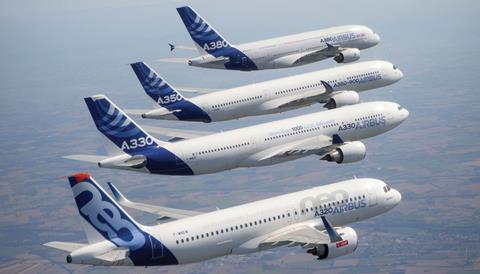The Office of the US Trade Representative has raised its tariffs on large European aircraft to 15%, up from the 10% levy implemented last October, in an ongoing dispute over subsidies.
“The United States is increasing the additional duty rate imposed on aircraft imported from the EU to 15% from 10%, effective March 18, 2020, and making certain other minor modifications,” the USTR says in a statement published on 14 February.

At the centre of the ruling last October were EU subsidies for Airbus, which the arbitrator heavily criticised as being “WTO-inconsistent”, and causing adverse effects to the USA.
While the USTR was permitted to impose up to 100% tariffs on $7.5 billion of goods — including Airbus jets — the office said at the time it would initially impose 10% levies on new commercial aircraft of more than 30t, and 25% levies on other products such as Irish and Scotch whisky, German machinery, and cheese.
The increase to 15% is in response to a World Trade Organization report related to a longstanding subsidy dispute involving Airbus. That report, released 2 December, concluded that changes made to A350 and A380 development loans were insufficient to bring European governments into compliance with WTO recommendations.
On 12 December the US Trade Representative announced a review of the tariffs and requested public comments. It says it received more than 26,000 responses.
“Based on this review, the US Trade Representative has determined to revise the action being taken by increasing the rate of additional duties on certain large civil aircraft, and by modifying the list of other products of certain current and former EU member states subject to additional 25% duties,” the USTR writes in its ruling. With this new ruling, the tariffs on non-aircraft products remain at 25%.
Airbus has a large presence in the USA, including an A320 and A220 assembly site in Mobile, Alabama. It said in October that 40% of its aircraft-related procurement comes from US companies. The ruling, which applies to aircraft built in Europe, means that parts shipped over the Mobile to be assembled appeared to be exempt from the additional tariffs.
While US carriers with large Airbus fleets such as Delta Air Lines and JetBlue will receive some of their deliveries from Mobile, the majority of Airbus aircraft are still manufactured at the company’s European hubs of Hamburg and Toulouse. It is unclear as to what the effect of these increased tariffs will have on the affected airlines, as well as the traveling public who may ultimately pay higher fares as a result.
Airbus has been working to mitigate the impact of tariffs since they were initially imposed. Chief executive Guillaume Faury stated at a briefing on 13 February that the tariffs have had a ”direct imipact” on its US commercial aircraft customers which “we are working to manage”.
“Later this year the WTO is expected to authorise the EU to impose tariffs on US products. We remian hopeful that the US and EU will find a negotiated settlement to avoid further damage,” he says.
The US government will be allowed to impose the tariffs until the EU brings its practices into compliance with WTO standards. In arriving at the $7.5 billion price tag, the arbitrator took into account the value of the lost sales of large Boeing aircraft as a result of the subsidies.

No comments:
Post a Comment